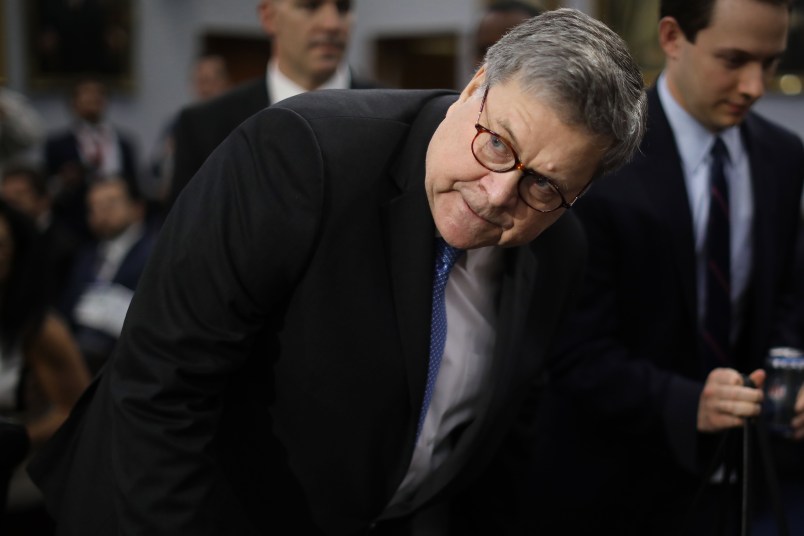Attorney General Bill Barr said Wednesday that he took it upon himself to decide that President Trump did not obstruct justice in the investigation into Russia’s interference in the 2016 election.
Testifying before a Senate Appropriations subcommittee, Barr acknowledged that special counsel Robert Mueller never told Barr that he should feel authorized to make this determination.
The answer came during a round of questioning by Sen. Patrick Leahy (D-VT), who asked if the special counsel had explained his decision not to answer the obstruction question himself. Barr said that they’d had a conversation about it.
“He also has a fuller explanation of that in the report that I’ll be making available hopefully next week,” Barr added, referring to Mueller.
“Did he express any expectation and interest in leaving the obstruction decision to Congress?” Leahy asked.
“Not that—he didn’t say that to me, no,” Barr replied.
“So he said the obstruction decision should be up to you?” Leahy pressed.
“He didn’t say that either,” Barr said. “But that’s generally how the Department of Justice works. Generally grand juries are to investigate crimes and a prosecutor’s role at the end of the day is binary. Are there charges or no charges, or is this a crime or not a crime.”
Barr said that he would provide more information on his decision-making process on obstruction during his May testimony before the House and Senate Judiciary Committees. During subsequent questioning by Sen. Chris Van Hollen (D-MD), Barr repeatedly said he was not going to offer any more information about how he made his determination until then.
“The President went out and tweeted the next day that he was exonerated,” Van Hollen said. “That was not based on anything from the Mueller report with respect to obstruction of justice, that was based on your assessment of March 24 and now you won’t elaborate at all as to how you reached that conclusion. ‘Cause I’m not asking about what is in the Mueller report, I’m asking about your conclusion.”
“It was the conclusion of a number of people including me and I am obviously the attorney general,” Barr replied. “It was also the conclusion of Deputy Attorney General Rod Rosenstein.”
Barr asserted in an unsolicited 2018 memo sent to the Justice Department that Trump could not have obstructed justice in the Russia probe. Career DOJ ethics officials concluded that Barr did not need to recuse himself from this matter despite voicing his opinion on it last year, according to Wednesday’s testimony.
Barr also appeared to slightly lengthen the time frame for the report’s release.
On Wednesday, Barr said it will come out “hopefully next week;” in Tuesday testimony before the House he said it could be expected “within a week.”







Barr keeps acting like he is holding a line but completely adrift. Not exactly the expectation.
Didn’t the County Fair have Bumper Cars?
So according to Barr, Mueller did not ask him to make the determination on obstruction, nor did he suggest that Congress do so. So Mueller threw up his hands and said, “This is just too difficult for me to decide. Let someone else decide, though I have no idea who that should be.” Very likely.
Barr’s suggestion is that when the fascistgop controls the DOJ, then the appointees of the abomination along fascistgop enablers will decide what evidence of corruption and malfeasance by the abomination will be made public, because that’s how the DOJ “generally works”
Really?
I think Mueller knows that there ate plenty of impeachable offenses in his report, but he can only recommPend charges in the court of law. Congress has to bring impeachment charges.
Mueller knows the report can’t stay hidden forever.